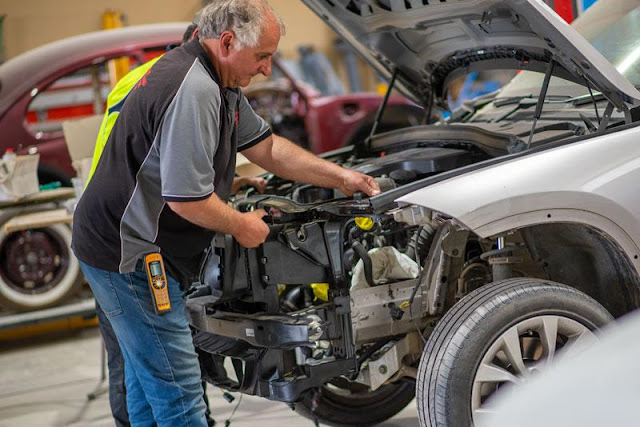How To Choose The Right Panel Beater For Your Car Repair Needs
November 24, 2023Introduction
In the realm of car repairs, a 'panel beater' is a term you might come across. Serving a crucial role in the auto repair industry, a panel beater is a professional who specialises in restoring vehicles to their factory state after they've been damaged. From minor dents and bumps to major collision damages, the primary responsibility of a panel beater is to beat and manipulate car bodies' metal panels back to their original shape and smoothness. Essentially, their mastery lies in turning wrecks into shiny, as-good-as-new vehicles. To select an ideal panel beater, one must understand their vehicle’s needs, have a grasp on what panel beating entails, and know what qualities to look for in a professional. This comprehensive guide aims to help you navigate this arena, making the process of finding a suitable panel beater a breeze.
Understanding Your Car Repair Needs
When your car suffers damage, identifying the extent and spectrum of necessary repairs is a fundamental first step. This groundwork allows you to articulate your requirements to potential panel beaters more effectively. Assess the damage visually and take note of any functional issues. External damage may be clear to spot - these can include scratches, dents, or punctures. Internal damage, on the other hand, may require a professional look for symptoms like unusual noises, leaking fluids, or mechanical problems. Once you've scaled the damage, understanding the repair scope becomes clearer. This can range from minor paint touch-ups to replacing whole body parts. Having a fair idea of your car repair needs can lead to more accurate quotes and timelines from panel beaters.
The Ins And Outs Of Panel Beating
Panel beating is more than just hammering out dents on a vehicle – it is a meticulous process involving various stages. The initial stage is assessing the damage and planning a repair strategy. This is followed by disassembling the relevant parts of the vehicle for better access to damaged areas. Next, the actual rectification happens– the panel beater uses specialised tools to beat or 'massage' the panels back into their factory shape. In this process, some parts may need replacement rather than repair. Post this, filling, sanding, and priming take place to smooth out any imperfections and prepare the surface for painting. The penultimate stage involves painting and clear coating, matching the factory colour and finish. After a quality check, final touch-ups and reassembly occurs. Thus, when selecting a panel beater, understanding this process can help you estimate the work involved in your vehicle's repair and the expertise required.
Qualities To Look For In A Panel Beater
When selecting a panel beater, several qualities should top your checklist. Primarily, a panel beater must possess a high level of technical skill and experience. Years in the auto repair industry are often a testament to their competence. Additionally, a good panel beater will have a solid understanding of various vehicle makes and models, which is crucial for a successful repair. Customer service is another important area. Quick response times, availability, openness to questions, and clear communication about the repair process and costs contribute to a satisfactory experience. Moreover, a loyal customer base and strong local reputation can also be indicative of a good panel beater.
Do Brands Matter When Choosing Panel Beaters?
Consideration of a panel beater’s knowledge on your vehicle's brand is worthwhile, as different car brands have unique body designs, manufacturing processes and materials. A professional well-versed with your type of car will likely anticipate specific challenges associated with it better and be more efficient in the repair process. However, a panel beater's competence shouldn't ideally be completely restricted to your car's brand. With the basic technical know-how, and sufficient experience, a professional can work effectively on a variety of car models.
The Importance Of Certification And Accreditation
One important filter in choosing a panel beater is their professional certification and accreditation. These recognise the panel beater’s adherence to industry standards of best practice, safety, and quality. Certification from the Australian Panel Beaters and Smash Repairers Association (APBSRA) or Motor Trades Association (MTA) is a good start. Having insurance provider affiliations can also be a plus, as it testifies trustworthiness. Therefore, before selecting a panel beater, check these details on their website or inquire directly.
Comparing Quotes: The Fine Balance Between Cost And Quality
Labeling cost estimation as trickily important would be an understatement. While it's tempting to choose a panel beater who quoting the lowest price, it's critical not to compromise on quality. To compare quotes accurately, make sure they cover the same spectrum of repair work. Often, hidden costs aren't included in initial quotes- these might pop up later as 'additional' or 'unforeseen' expenses. Some panel beaters might skimp on quality to offer a lower price - they could use cheaper, non-genuine parts or skip necessary processes. Therefore, a thorough understanding of what the quote includes and doesn't is essential for a fair comparison.
Probing Into Past Works: Why Reviews And References Matter
Reviews and references can be invaluable during the panel beater selection process. They provide insights into the panel beater's past works, customer satisfaction levels, and any recurring issues. Online reviews are readily available on various platforms - Google, the panel beater's own website, and social media profiles, to name a few. While analyzing reviews, look for trends rather than one-off comments which could be anomalies. Reach out to customers who have had similar repair needs as you, if possible, for a more relevant perspective.
Mistakes To Avoid When Choosing A Panel Beater
During the selection process, it is essential to be aware of potential pitfalls. One common mistake is making hasty decisions driven by price alone. Remember, cheap can sometimes be costly in the long run if the quality of work is compromised. Additionally, choosing a panel beater based solely on proximity can be limiting - sometimes, traveling a bit further can lead you to a more competent professional. Neglecting to check accreditations and affiliations is another error to avoid - these are indicators of a panel beater's credibility.
Trusting Your Gut: Why Instinct Matters
While hard facts and logical evaluation play a significant role in choosing a panel beater, the instinct or 'gut feeling' isn't to be undermined. Your visceral reaction to a panel beater or their workshop- the way they interact, their confidence, tidiness of their workspace, and the overall vibe- can often steer your decision correctly. After all, this is the person you'll entrust your prized vehicle to, and comfort gained from direct interactions can be enlightening.
Conclusion
Navigating the realm of auto repair and choosing an ideal panel beater is an undertaking that demands a systematic approach and informed decision-making. But armed with this comprehensive guide, you should now be equipped with the knowledge needed to make the best choice for your vehicle's repair needs. From understanding the essence of panel beating to knowing what to look for in an ideal panel beater, the journey doesn't seem so arduous, does it?




0 comments